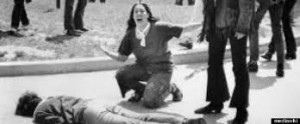 We live in chaotic times. Many feel that our fragile economy could come crashing down at any time. One devastating terrorist attack, false flag attack or natural disaster could lead to an unprecedented disaster and martial law would be declared. Some Americans would take to the streets and the only remaining question is whether or not American soldiers, called to the scene, would restore order by firing upon American citizens when ordered to do so?
We live in chaotic times. Many feel that our fragile economy could come crashing down at any time. One devastating terrorist attack, false flag attack or natural disaster could lead to an unprecedented disaster and martial law would be declared. Some Americans would take to the streets and the only remaining question is whether or not American soldiers, called to the scene, would restore order by firing upon American citizens when ordered to do so?
This scenario and the resulting public execution of American citizens for engaging in protesting has happened many times in our past. For those old enough to remember, the 1970 Kent State massacre should come to mind as the Ohio National Guard opened fire on protesting college students on the campus of Kent State University. But for those who believe that this was merely an anomaly, let’s examine what the field of psychology has discovered about the answer to this question.
The Oath Keepers Cannot Save Protesters
Some our citizens are deluded into a false sense of security by the group known as Oath Keepers. It is a well-intentioned effort to remind both law enforcement and the military to uphold the Constitution and to disobey unlawful orders which would bring harm to American citizens. Under this false sense of security, many in the American public really believe that American troops will not fire upon American citizens. Unfortunately, the field of psychology demonstrates why only a minority of soldiers will actually resist committing atrocities against the American people.
Conformity to Group Norms: The Solomon Asch Experiment
Do you think of yourself as a conformist or a non-conformist? If you ask most people the same question, you would find that most people consider themselves to be a non-conformist and would be able to stand up to a group when they know they are right. However, can nonconformists actually resist the peer pressure to blend in with the rest of their peers?
In the 1950′s, Polish born psychologist, Solomon Asch, conducted a conformity study. The participants signed up to participate in a psychology experiment in which they are asked to complete a vision test. This was a deception. The real experiment attempted to answer the question, can people resist peer pressure to conform to a false belief?
Seated in a room with the other participants, the research participants are shown a line segment and then asked to choose the matching line from a group three segments of different lengths.
This post was published at The Common Sense Show on September 9, 2014.

 Follow on Twitter
Follow on Twitter
Recent Comments